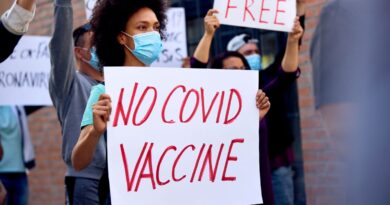Fake news: authorities rush to correct rumours that COVID-19 vaccines affect fertility

False claims that the recently introduced COVID-19 vaccines impair fertility have been spreading on social media since December. The public worries which followed have prompted a unified response from professional and news organisations, denouncing the misinformation and particularly the ‘science’ behind it.
There have been press reports in the past few weeks of women refusing a COVID-19 vaccination because of fears of infertility. Fake news, yes, but not considered fake enough to prevent a wave of doubt sweeping across social media from early December onwards. In February the Washington Post described women of reproductive age as a ’surprising roadblock to efforts to halt the pandemic’, attributing their vaccination refusal to ‘disinformation spread on Facebook, Twitter and other social media’.(1) Vaccine uptake among female staff at US nursing homes and hospitals has been reported as low as 20 to 50%, according to the Washington Post. A study of vaccine uptake in the Middle East concluded that a reliance on social media as the main source of information about COVID-19 vaccines was linked to vaccine hesitancy.(2)
Some experts in the USA have described the public concerns as understandable given the lack of pregnancy and fertility data to emerge from the first clinical trials. ‘So far,’ said the UK’s RCOG in its latest statement, ‘none of the vaccines have undergone specific clinical trials in pregnant women, something that urgently needs to change.’ But there has also been an emerging concern based on scientific misinformation that the messenger RNA technology might prompt an immune response against a glycoprotein in the placenta known as syncytin-1, apparently similar in structure to the coronavirus spike protein. This false claim, said to have originated with conspiracy theorists in Europe, has now been dismissed. For example, a study which measured the response of 3000 or so different proteins to the antibodies formed as a result of natural infection or vaccination found none for syncytin-1, prompting the author, Yale immunologist Akiko Iwasaki, to describe the fears as ‘nonsense’.(1)
US vaccine manufacturers Pfizer and Johnson & Johnson have each recently announced that their trial programme will now be extended to pregnancy.(3) Though such data will doubtless be needed to counter even the wildest conspiracy theory, the wave of misinformation has still prompted several authorities to make clarifying statements. In Britain, the RCOG and British Fertility Society reported categorically that there is ‘absolutely no evidence, and no theoretical reason, that any of the vaccines can affect the fertility of women or men’.(4,5) A ‘myth-busting’ BBC reality-check on the infertility claims found them ‘unfounded’.(6) And the director of the WHO’s department of immunisation said: ‘The vaccines we give cannot cause infertility . . . and there’s no truth to the rumor.’
Similarly, the ASRM, which, following the line of several US fact-checks, reported in its January guidance that the Pfizer-BioNTech vaccine does not induce an immune reaction against the syncytin-1 placental protein, categorically stated that the COVID-19 vaccines ‘do not cause infertility in women or men’, but still noted that some 27% of the US public remains vaccine-hesitant.(7)
The many press reports suggest that the doubters were not just ill-defined anti-vaxxers or solely motivated by fears of infertility, but were often associated with specific social, occupational and ethnic groups. The ASRM’s January update quoted a December study from the Kaiser Family Foundation showing that no more than 70% of people questioned (presumably all American) would ‘probably or definitely’ have the vaccine if offered.(8) Main reasons for hesitancy were worries about side effects (50%), the role of politics (51%) and lack of trust in the vaccine.
Meanwhile, the latest joint statement from ESHRE and IFFS recognised that ‘all countries have groups of patients reluctant to utilize vaccines’, whose concerns were raised ‘by the urgency and manner in which the COVID-19 vaccines were developed’. ‘Their concerns,’ adds the statement, ‘should be acknowledged but the available evidence suggests that the potential benefits of vaccination strongly exceed the hypothetical risks.’(9) This and other guidance all now emphasise the importance of professionals to support the vaccine programmes, address public concerns point by point, and build trust in the vaccines in pregnancy.
1. https://www.washingtonpost.com/health/2021/02/22/women-vaccine-infertility-disinformation/doi.org/10.1016/S2542-5196(20)30268-0
2. Sallam M, Dababseh D, Eid H, et al. High rates of COVID-19 vaccine hesitancy and its association with conspiracy beliefs: A study in Jordan and Kuwait and other Arab countries. Vaccines 2021; doi.org/ 10.3390/vaccines9010042
3. See https://www.pfizer.com/news/press-release/press-release-detail/pfizer-and-biontech-commence-global-clinical-trial-evaluate
4. https://www.rcog.org.uk/en/news/RCOG-and-RCM-respond-to-misinformation-around-Covid-19-vaccine-and-fertility/
5. https://www.britishfertilitysociety.org.uk/wp-content/uploads/2021/02/Covid19-Vaccines-FAQ-1_3.pdf
6. See https://www.bbc.co.uk/news/health-56012529
7. https://www.asrm.org/globalassets/asrm/asrm-content/news-and-publications/covid-19/covidtaskforceupdate12.pdf
8. https://www.kff.org/coronavirus-covid-19/report/kff-covid-19-vaccine-monitor-december-2020/
9. https://www.eshre.eu/Europe/Position-statements/COVID19/JointESHRE_IFFSvaccination


